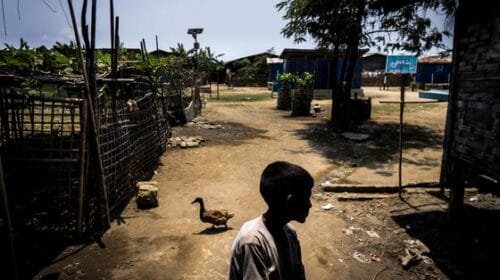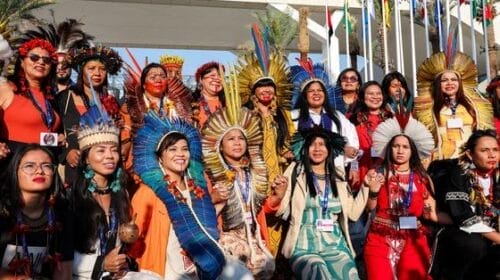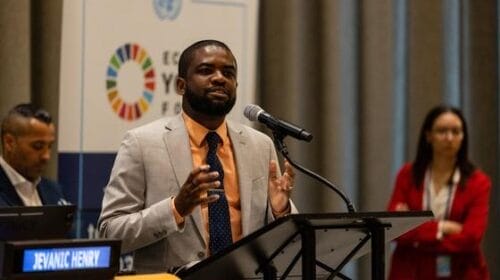Tuesday’s Daily Brief: #GlobalGoals progress, essential meds, updates from Cox’s Bazar, Sudan and DR Congo
Now is the time to seize ‘unprecedented opportunity’ of the Sustainable Development Forum, says ECOSOC President
Nations across the world now have an “unprecedented opportunity to talk to each other and learn from each other”, Inga Rhonda King, President of the UN Economic and Social Council (ESOSOC), said on Tuesday, kicking off the annual High-level Political Forum on Sustainable Development (HLPF) in New York.
The HLPF is the chief global forum for reviewing successes, challenges and lessons learned, on the road towards reaching the 17 Sustainable Development Goals (SDGs) by 2030.
Read our full coverage here.
Universal education goal ‘unrealistic’, warns UNESCO
Nations are not doing enough to ensure that every child goes to school – and stays there – by 2030, a key commitment of the 2030 Global Goals agenda, UNESCO said on Monday. According to data from the UN’s Educational, Scientific and Cultural Organization, one in six youngsters aged between six and 17 will still be out of class in a decade’s time.
Attendance levels are best in primary school, with information from nearly 150 countries showing that 84 per cent of children completed this first educational tier in 2018, up from 70 per cent in 2000. With an extra push and investment, UNESCO believes that getting all children into primary school “is just possible”, by 2030.
But it warns that as children get older, attendance levels are much lower, with four in 10 children globally expected not to complete secondary education by 2030. This figure is likely to grow to half of all youngsters in sub-Saharan Africa, where the school-age population is growing faster than anywhere else, UNESCO says.
Groundbreaking cancer-fighting drugs now included in updated UN list of essential medicines
The UN health agency, WHO, announced on Tuesday that dozens of new drugs have been added to the list of essential medicines that every country should have, including new cancer treatments that can be swallowed rather than injected.
More than 150 countries use the UN’s Essential Medicines List, which contains around 460 drugs deemed critical to treat public health needs. This latest update adds 28 products for adults and 23 for children, and specifies new uses for 26 already-listed products, based on value for money, evidence and health impact.
Find out more with our full story here.
And our interview with two WHO experts on the story today, is below.
‘Brutal weather’ continues as Rohingya refugee children endure devastating rainfall in Bangladesh
Heavy flooding and landslides in the Rohingya refugee camps of Cox’s Bazar in Bangladesh, has left thousands of children and families in an increasingly dire situation with critical infrastructure damaged or destroyed, the UN Children’s Fund (UNICEF) warned on Tuesday, while scaling up relief efforts to those vulnerable children.
“Conditions in the camps and host community are deteriorating rapidly because of the brutal weather”, said Alain Balandi Domsam, acting UNICEF Bangladesh Representative, while stressing that “the humanitarian needs here are only likely to grow over the coming days with more downpours expected.”
Read the full story here.
Sudan in spotlight at Human Rights Council as top UN official appeals for dialogue to resolve grievances
All grievances linked to violence perpetrated against Sudanese protesters by security forces across the country should be investigated independently and justice must be served, a top UN rights official said on Tuesday.
Speaking at the Human Rights Council, Andrew Gilmour, Assistant Secretary-General for Human Rights, welcomed last week’s reported power-sharing deal between the transitional military authority and civilian representatives. He said that the UN stood ready help the country “strengthen the protection of human rights” as it embraced civilian rule, after mass protests beginning in December last year, that led to the toppling of President Omar al-Bashir four months later.
“We encourage all parties in Sudan to continue to resolve any outstanding issues through dialogue. OHCHR welcomes that the agreement reached last week includes a commitment to conduct an independent investigation into the violence perpetrated against peaceful protesters. More details have emerged about casualties during the mass protests that took place in towns and cities across Sudan on 30 June 2019. It is important that investigations bring justice to all victims of such violence.”
In reply, Sudan’s Osama Hemeida expressed gratitude for regional efforts to resolve tensions inside the country, while also acknowledging the “heroic” and “inspiring popular revolution”, led in particular by young people. The Sudanese representative then confirmed the imminent release of all political prisoners and many others who had been arrested under state of emergency laws, along with an end to the curfew.
He also noted that the findings of an independent probe into the deaths of protesters at a sit-in outside military headquarters in Khartoum on 3 June would be produced “in the next few days”, while another inquiry into abuses since April was ongoing.
A unique opportunity to right tragic wrongs of the past for DR Congo’s Kasaï region
With the decrease of violence in the Kasaï region of the Democratic Republic of the Congo (DRC), the arrival of new civilian authorities, and the appointment of a new prime minister, the conditions are in place to begin the fight against impunity and work towards the reconciliation of communities, said two UN independent human rights experts on Tuesday.
The region, one of the country’s poorest, was the theater of tremendous atrocities – including the enslavement of women and children – in 2016 and 2017, leading hundreds of thousands to be displaced and in need of life-saving assistance. A reconciliation process between fighting communities began in September 2017.
“The authorities need to act now,” stated Bacre Waly Ndiaye, Chairperson of the human rights team mandated with monitoring the situation in the Kasaï region. He was presenting the team’s report to the UN Human Rights Council in Geneva, following three missions to verify the implementation by the Congolese government of the recommendations made by the previous team of experts.
This new report stresses that impunity prevails and highlights the need for the Congolese authorities to punish serious crimes committed in Kasaï between 2016 and 2017, and to create the necessary conditions for a reconciliation of the communities. The experts also noted that these efforts would be in vain in the absence of economic and social development policies in Kasaï, a landlocked region suffering from a chronic deficit in infrastructure.
“Although there are obstacles to overcome, it is still possible to get Kasaï out of the crisis, to move towards justice and an inclusive resolution of the conflict and progress,” said Mr. Ndiaye.
Listen to or download our audio News In Brief for 9 July on SoundCloud:










